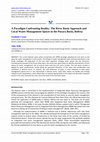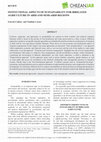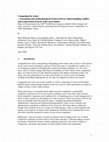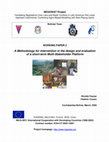Papers by Vladimir Cossio

Water alternatives, 2017
The current Bolivian water policy incorporates the IWRM paradigm adopting the river basin as the ... more The current Bolivian water policy incorporates the IWRM paradigm adopting the river basin as the space for water management in the country. The linkage of water management with communal territories in the Andes challenges the application of the river basin approach, bringing water spaces into the discussion. Considering the example of the Pucara River Basin, the article uses space theory to identify characteristics of local spaces for water management and to contrast them with the river basin concept. The river basin concept is applied by water professionals, mostly taking the perceived dimension of this space into consideration and sometimes in abstract terms. In contrast, the lived dimension of space is more important in local water management spaces and it is not represented in abstract terms. Local water spaces are flexible and strongly related to local organisations, which allows them to respond appropriately to the needs and demands of peasant society in the area, characteristics that cannot be found in the river basin space.
… research paper (available …, 2005
The Tiquipaya Municipality is situated in the peri-urban zone of Cochabamba city, in Bolivia. Its... more The Tiquipaya Municipality is situated in the peri-urban zone of Cochabamba city, in Bolivia. Its valley part is inhabited by 26,000 people. Drinking water is distributed by community-based Water Committees, without the intervention of the Municipality. With the exception ...

Chilean Journal of Agricultural Research, Dec 1, 2009
Concerns, arguments, and approaches to sustainability are exposed in both scientific and technica... more Concerns, arguments, and approaches to sustainability are exposed in both scientific and technical irrigation literature which is based on the priority of food production and water preservation as a basic resource. Different approaches related to sustainable irrigated agriculture are identified beyond the technical considerations of irrigation as dealt with by very specialized scientific literature. These focus on socioeconomic and institutional aspects of irrigation management. In this chapter, four main approaches are discussed: "New institutionalism" is an approach which emphasizes economic and financial issues such as cost recovery and the role of the market in water rights reallocation. A second approach, "Common pool resources management" highlights the role of local organizations and institutions with respect to collective water management, and the possibilities to design "robust institutions" considering the involvement of different stakeholders, not only (state) authorities. A third is identified as the "Empowerment approach". In this approach, topics such as power relations, autonomy, gender relations, as well as water rights and access are considered as key elements configuring water management practices in irrigation systems. Finally, there is the "Post-institutional approach". It outlines concepts such as "institutional bricolage", uncertainty, and legal pluralism used as analytical elements to understand the dynamics and complexities of irrigation development. In conclusion, different levels to analyze sustainability are discussed from an institutional perspective by identifying key knowledge gaps and the need to integrate some of the elements found in the different approaches.
The Tiquipaya Municipality is situated in the peri-urban zone of Cochabamba City, in Bolivia. 26,... more The Tiquipaya Municipality is situated in the peri-urban zone of Cochabamba City, in Bolivia. 26,000 inhabitants live in the valley part of the municipality. Drinking water is distributed by community-based Water Committees, without the intervention of the Municipality. With the ...
Peri-Urban Water …
That poorly planned or unplanned urbanisation processes have dramatic effects on land use, agricu... more That poorly planned or unplanned urbanisation processes have dramatic effects on land use, agriculture and livelihoods in peri-urban areas, we have seen in the previous chapters. in Cochabamba, the encroachment on traditional irrigation systems is threatening the ...
Peri-Urban Water ConfliCts …
Page 25. 25 CHaPter 2 Supporting local organisations in peri-urban Cochabamba, Bolivia Nicolas Fa... more Page 25. 25 CHaPter 2 Supporting local organisations in peri-urban Cochabamba, Bolivia Nicolas Faysse, Rocio Bustamante, Alfredo Duran Nuñez Del Prado, Pablo Cuba, Raul Gerardo Ampuero Alcoba, Vladimir Cossio Rojas ...
XIIIth World …, 2008
Competition for water is intensifying. Depending on the context, this is due to (i) the advent of... more Competition for water is intensifying. Depending on the context, this is due to (i) the advent of new users (tourist enterprises, growers of bio-fuel crops or vegetables for exports, etc.); (ii) changing use patterns (changing diets, improved housing standards, etc.; (iii) more users; and (iv) ...
Presentation of the topic and analysis of the issue: Tiquipaya is a Municipality situated in the ... more Presentation of the topic and analysis of the issue: Tiquipaya is a Municipality situated in the peri-urban zone of Cochabamba city, Bolivia. Nowadays, drinking water is distributed by community-based Water Committees and just a small part of the population has a sewage system. In this situation Tiquipaya and the nearby Colcapirhua Municipality decided to implement a joint water and sanitation project, called MACOTI. The critics of many Water Committees to this project led to a series of conflicts in 2003.

ABSTRACT: Governments, NGOs and financers invest considerable resources in rural domestic water s... more ABSTRACT: Governments, NGOs and financers invest considerable resources in rural domestic water supplies and irrigation development. However, elite capture and underuse, if not complete abandonment, are frequent. While the blame is often put on 'corrupt, lazy and indisciplined ' communities, this article explores the question of how the public water sector itself contributes to this state of affairs. Four case studies, which are part of the research project Cooperation and Conflict in Local Water Governance, are examined: two domestic water supply projects (Mali, Vietnam); one participatory multiple use project (Zambia); and one large-scale irrigation project (Bolivia). It was found that accountability of water projects was upward and tended to lie in construction targets for single uses with already allocated funding. This rendered project implementers dependent upon the village elite for timely spending. Yet, the elite appeared hardly motivated to maintain communal schem...

XIIIth World Water …, 2008
Water governance is essentially about addressing such competitive or potentially competitive situ... more Water governance is essentially about addressing such competitive or potentially competitive situations of two or more parties seeking access to the same water resource. Such competitive situations can be addressed by (i) regulating access to and management of water resources and by (ii) developing new water resources. Water governance involves the processes through which decisions are made-including legislation formulatedimplemented, contested and reaffirmed through political, legal, social, economic and administrative institutions at different levels of society. The issues that are addressed include who should have access to water, for which purpose, when, in which quantity and quality, at the expense of whom, which obligations should be met to maintain this access, and which sanctions should be in place in case of non-compliance. Empirically, water governance can thus be characterized according to the way in which competitive situations are dealt with as well as their outcome. Useful descriptors of water governance include the extent to which competing claims for water lead to conflict or cooperation, and nature and intensity of water-related conflict and cooperation.
Proyecto …, 2006
Los Juegos de Roles (JdRs) son cada vez más utilizados para apoyar discusiones en grupo y facilit... more Los Juegos de Roles (JdRs) son cada vez más utilizados para apoyar discusiones en grupo y facilitar la organización o mejora de una acción colectiva. Éstos representan una situación virtual, pero suficientemente cercana de la realidad, dentro de la cual los participantes ...

En este articulo se describe la implementacion de la metodologia del Water Point Mapping (WPM) co... more En este articulo se describe la implementacion de la metodologia del Water Point Mapping (WPM) con el fin de estudiar el acceso sostenible al agua potable y al saneamiento basico e higiene en el municipio de Tiraque (Cochabamba, Bolivia) . E l WPM se fundamenta en realiza r un mapeo exhaustivo de los puntos de agua “mejorados”, y en este caso se ha complementado el mapeo con un muestreo aleatorio de casas para obtener informacion relacionada con el saneamiento y las practicas higienicas. Por lo tanto, el estudio usa dos fuentes de informacion diferentes: (i) el punto de agua, y (ii) la familia; y el analisis de datos posterior se plantea a tres escalas distintas: (i) la comunidad, (ii) el distrito, y (iii) la municipalidad. En base a toda la informacion recogida se han identificado y analizado un conjunto reducido de indicadores criticos para la e valuacion del sector desde diferentes perspectivas (disponibilidad de infraestructura, estado de los puntos de agua y de las letrinas, ca...
Water alternatives, 2017
The current Bolivian water policy incorporates the IWRM paradigm adopting the river basin as the ... more The current Bolivian water policy incorporates the IWRM paradigm adopting the river basin as the space for water management in the country. The linkage of water management with communal territories ...

This document proposes a methodology for the implementation of a multi stakeholder platform that ... more This document proposes a methodology for the implementation of a multi stakeholder platform that may be utilized by an organization as a form of intervention in order to solve a specific problem. The methodology considers four stages: (i) Baseline analysis in which the causes of the problem, the stakeholders and the reasons for a lack of agreements are analyzed, and the existing negotiation processes are assessed; (ii) Ex ante evaluation, which includes the assessment of whether an intervention is needed, whether it is an opportune moment and the kind of intervention needed; (iii) Design of the platform, which encompasses the definition of the convening organization and the facilitator, the basic structure of the platform, the relationship between the platform and the constituencies, and the structure of the sessions, and; (iv) Monitoring and evaluation based on the objectives of the platform and the actions of the facilitator. The methodology establishes a general framework that sh...
Uploads
Papers by Vladimir Cossio